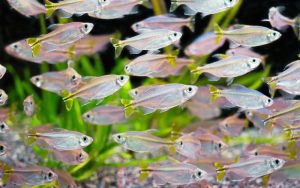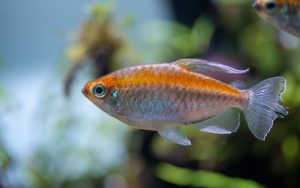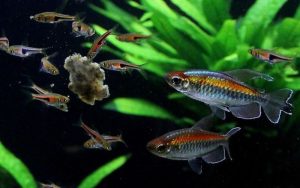In the vibrant world of aquarium enthusiasts, an age-old debate continues to stir curiosity and spark discussions: mosquito fish vs. guppy. These tiny aquatic creatures might seem unassuming, but don’t be fooled by their size!
Behind their delicate exteriors lie fascinating traits that make them both popular choices for hobbyists and pest controllers.
As we delve into the depths of this underwater face-off, we’ll explore the unique attributes that set mosquito fish and guppies apart.

From their distinct physical characteristics to their behavior and ecological significance, there’s much to consider in determining which species is the ultimate champion in the fish tank realm.
So, if you’ve ever wondered about the contrasting traits and hidden superpowers of these two water-dwelling contenders, join us on this aquatic adventure as we uncover the truth behind mosquito fish and guppy and maybe even help you decide which one could be the perfect fit for your underwater kingdom!
Table of Contents
ToggleAre Mosquito Fish and Guppies The Same?
Mosquito fish and guppies are not the same, although they are both types of freshwater fish. Mosquito fish, or Gambusia, belong to the genus Gambusia and are typically around 1.5 inches long.
They are known for their ability to eat mosquito larvae, which makes them helpful in controlling mosquito populations in some areas.
Guppies, on the other hand, belong to the Poecilia genus and are also small freshwater fish. Guppy Males are typically smaller than male mosquito fish, reaching only about 1 inch in length, whereas male mosquito fish can reach up to 1.5 inches. Female guppies, however, are slightly larger than females of both species.
Guppies are popular aquarium fish known for their bright colors and distinctive patterns. They are sometimes confused with platyfish, the same genus as guppies but have a flatter body shape.
In summary, although mosquitoes and guppies are both types of freshwater fish, they belong to different species (Gambusia and Poecilia, respectively) and have some physical differences in size and appearance. Additionally, mosquito fish are known for their ability to eat mosquito larvae, while guppies are popular aquarium fish.
What Are the Differences Between Mosquito Fish and Guppy?
Mosquito fish vs Guppies: Mosquito fish and guppies are both fish species, but they have several differences. Firstly, as their name suggests, mosquito fish have a specific affinity for mosquito larvae and are often used as a natural control method for mosquito populations.
Guppies, on the other hand, do not have this specialized diet. Another difference is their size. Mosquito fish are generally larger, growing up to three inches long, while guppies are typically smaller, reaching only about two inches.
Additionally, guppies are more colorful than mosquito fish, with vibrant patterns and hues. Finally, while mosquito fish are primarily found in freshwater environments, guppies can adapt to freshwater and saltwater habitats. These differences showcase the unique characteristics and attributes of both mosquito fish and guppies.
5 Aquarium Facts: Mosquito Fish vs Guppy
1. Appearance: Mosquito Fish vs. Guppy
Mosquito Fish and Guppies exhibit striking appearances but possess unique characteristics that set them apart.
Mosquito Fish:
The Mosquito Fish, scientifically known as Gambusia affinis, boasts a slender body with a streamlined shape, allowing it to glide effortlessly through the water. They are generally smaller than Guppies, with the males measuring around 1.5 inches and females slightly larger at 2.5 inches. Mosquito Fish often exhibit a pale yellow or silvery-grey coloration with hints of green or brown.
Guppies:
Scientifically called Poecilia reticulata, guppies are renowned for their vibrant and eye-catching colors. Males feature vibrant hues like red, orange, blue, and green, while females are more subdued. Guppies are slightly smaller than Mosquito Fish, with males reaching lengths of 1.2 to 1.6 inches and females ranging from 1.4 to 2.4 inches.
2. Mosquitofish vs. Guppy Behavior & Natural Habitat
The behavior of these two fish species varies significantly, making them fascinating additions to any aquarium.
Mosquito Fish:
Mosquito Fish are highly active swimmers and tend to inhabit the upper layers of the aquarium. They are well-known for their voracious appetite for mosquito larvae, making them popular for mosquito control in outdoor ponds. Additionally, Mosquito Fish are peaceful and coexist harmoniously with other fish species.
Guppies:
Guppies are renowned for their playful and energetic nature. They love to explore every nook and cranny of the aquarium, especially among densely planted areas. Guppies also exhibit a fascinating courtship dance, where the males showcase their colorful fins and vibrant colors to attract females. However, their playful nature may occasionally lead to nipping the fins of other tankmates.
3. Water Parameters: Mosquito Fish vs. Guppy
The water parameters required by Mosquito Fish and Guppies differ slightly, influencing their compatibility with different aquarium setups.
Mosquito Fish:
Mosquito Fish are highly adaptable and can tolerate various water conditions. They thrive in both freshwater and brackish water environments, with temperatures ranging from 64°F to 82°F (18°C to 28°C). They prefer slightly alkaline tank water with a pH between 7.0 and 8.5.
Guppies:
Guppies prefer warmer water temperatures compared to Mosquito Fish. They thrive in freshwater aquariums with temperatures ranging from 72°F to 82°F (22°C to 28°C). Guppies are more sensitive to water quality and require stable parameters, including a pH level between 6.8 and 7.8.
4. Reproduction: Mosquito Fish vs. Guppy
Mosquito Fish and Guppies are known for their prolific reproductive capabilities, but Mosquito Fish and Guppy breeding behaviors differ significantly.
Mosquito Fish:
Mosquito Fish are livebearers, meaning they give birth to fully developed fry instead of laying eggs. Female Mosquito Fish can store sperm for several months and produce multiple broods without requiring male presence. This unique adaptation allows them to reproduce rapidly and sustainably.
Guppies:
Guppies are also livebearers, and their reproduction rates are legendary in the aquarium hobby. Female Guppies can give birth to a dozen or more fry every few weeks. While this prolific breeding is exciting for some aquarists, it can lead to population explosions if not appropriately managed.
5. Ideal Tank Mates: Mosquito Fish vs. Guppy
Choosing compatible tank mates is crucial to maintain a harmonious aquarium environment. Here’s how Mosquito Fish and Guppies compare regarding ideal tank mates.
Mosquito Fish:
Mosquito Fish are peaceful and generally get along with many fish species. They are excellent community fish and can cohabit peacefully with other non-aggressive species like mollies, platies, and swordtails.
Guppies:
Guppies, with their friendly demeanor, are also excellent community fish. They thrive alongside peaceful species like neon tetras, Corydoras catfish, and dwarf gouramis. However, avoiding keeping them with aggressive or fin-nipping Fish is essential.
Fancy Guppy vs Mosquito Fish: Which Is Better?
Mosquitofish vs guppy: When controlling the mosquito population in a pond, mosquito fish and guppies are popular choices. However, there are some differences to consider when comparing the two species.
Mosquito fish, also known as Gambusia affinis, are specifically bred for their ability to control mosquito populations. They are hardy Fish that can tolerate many water conditions, including stagnant or polluted water. Mosquito fish can handle cooler temperatures and are generally more aggressive than guppies, allowing them to outcompete other fish species in the pond. They also have a higher reproduction rate, allowing them to multiply quickly and consume more mosquito larvae.
On the other hand, guppies (Poecilia reticulata) require warm water, and their ability to control mosquito populations is less effective than mosquito fish. While they can consume mosquito larvae, they are less efficient than mosquito fish, and their reproduction rate is lower. Guppies are also more susceptible to disease and require more care than mosquito fish.
In summary, if your main goal is to control the mosquito population in a pond, mosquitofish are generally considered the perfect option due to their hardiness, aggressiveness, and effectiveness in consuming mosquito larvae. However, if you are looking for a more visually appealing fish willing to provide the necessary care, guppies can also be an excellent addition to a pond.
What Is Mosquito Fish Best For?
Mosquito fish are livebearers, meaning they give birth to live young instead of laying eggs. Female mosquito fish are more prominent than males and have a gravid spot on their undersides, a dark patch near the anal fin indicating they are carrying babies.
In their natural habitat, mosquito fish can be found in northern South America’s slow streams, ponds, and brackish waters along the Gulf and Atlantic coasts of the United States. They are hardy Fish species that can tolerate a wide range of temperatures and are adaptable to different environments, making them easy to care for in an aquarium.
Mosquito fish are also known for their aggressive feeding habits, as they consume mosquito larvae and other small aquatic insects. In addition to controlling mosquito populations, these Fish can also be beneficial tank mates for other freshwater fish.
When kept in an aquarium, mosquito fish need a container with a minimum size of 10 gallons of water and a pH level between 7.0 and 8.0. They love a planted aquarium with plenty of hiding spots and should be provided with a diet of live and frozen foods.
Overall, mosquito fish are best known for their ability to control mosquito populations, but they also make attractive and easy-to-care-for freshwater fish for aquariums and outdoor ponds.
Can You Keep Mosquito Fish With Guppies?
Can you keep mosquito fish with guppies? The answer is yes, you can. Mosquitoes and guppies are small fish species that can be kept together in the same tank.
Mosquito fish, known as mosquitofish, are slightly smaller than guppies but can coexist peacefully. However, it is essential to remember that guppies are more colorful and may attract more attention than mosquito fish.
Additionally, guppies are known for their active and playful nature, which can sometimes intimidate the quieter mosquito fish. Therefore, providing plenty of hiding spots and plants in the tank is recommended to ensure both species have space and feel secure. Guppies and mosquito fish can thrive in the same tank with proper care.
Can Mosquito Fish Breed With Guppies?
Mosquito fish and guppies belong to different genera, Gambusia and Poecilia. As such, they cannot interbreed and produce offspring.
While both Fish are small and have similar physical features, they have different genetic makeups that prevent them from cross-breeding. Their reproductive organs are also other, making it impossible for them to produce viable offspring.
In an aquarium setting, it’s crucial to separate mosquito fish and guppies as they have different dietary requirements and are adapted to different environments. Guppies thrive in warmer water, while mosquito fish prefer cooler temperatures. Mixing the two Fish may lead to health problems and stress for both males and females.
It’s also worth noting that while guppies and mosquito fish cannot breed, guppies can interbreed with other species in the Poecilia genus, such as mollies. However, this should only be done under controlled conditions with careful consideration of the genetic makeup of both Fish.
Commonly Asked Questions about Guppy Fish Vs mosquitofish (FAQs)
Are Mosquito Fish and Guppies suitable for beginners?
Yes, both Mosquito Fish and Guppies are excellent choices for beginners. They are hardy, adaptable, and relatively easy to care for, making them ideal for those new to the aquarium hobby.
Can Mosquito Fish and Guppies coexist in the same aquarium?
Yes, Mosquito Fish and Guppies can coexist peacefully in the same aquarium. However, be cautious not to overpopulate the tank, as it may lead to potential water quality issues.
Do Mosquito Fish require a heater in their aquarium?
Mosquito Fish are hardy and can tolerate a wide range of temperatures, including cooler water. In warmer regions, they can thrive without a heater in their aquarium. However, if you live in a colder climate, a heater may be beneficial to maintain a stable temperature.
How often should I feed my Mosquito Fish and Guppies?
Both Mosquito Fish and Guppies are omnivores and have hearty appetites. Feed them small amounts of high-quality fish flakes or pellets twice daily, ensuring they consume the food within a few minutes to avoid overfeeding.
Can I keep Mosquito Fish or Guppies in outdoor ponds?
Yes, Mosquito Fish are particularly well-suited for outdoor ponds as they help control mosquito populations by consuming their larvae. Guppies can also thrive in outdoor ponds with stable water conditions and protection from extreme temperatures.
What are the differences between mosquito fish and guppies?
Mosquito fish and guppies are small tropical Fish but have several key differences. Mosquito fish are often larger and have a more elongated body shape, whereas guppies are smaller and more compact. Additionally, mosquito fish have a dorsal fin that is larger and more pointed, while guppies have a dorsal fin that is smaller and more rounded.
Where are guppies and mosquitofish native to?
Guppies are native to Central America, specifically from New Jersey to Central Mexico. On the other hand, mosquitofish are native to the Mississippi River basin and found in states such as Illinois.
Can mosquitofish and guppies coexist in the same aquarium?
Yes, mosquitofish and guppies can happily live together in the same aquarium. They are both small, live-bearing Fish that are relatively peaceful and friendly. However, ensuring the tank is large enough to accommodate both species and provide them with appropriate hiding places and ample swimming space is essential.
Are guppies and mosquitofish omnivorous?
Yes, both guppies and mosquitofish are omnivorous. They can eat various foods, including flakes, pellets, live or frozen fish food such as bloodworms, brine shrimp, and even small insects. Providing them with a balanced diet for optimal health and growth is crucial.
How fast do guppies and mosquitofish grow?
Guppies and mosquitofish are relatively fast-growing Fish. On average, guppies can reach their full adult size within four to six months, while mosquitofish can take slightly longer, typically getting their full size within six to nine months.
Do guppies require warm water to survive?
Yes, guppies are tropical Fish and prefer to live in warm water temperatures between 72-82°F (22-28°C). Maintaining the appropriate water temperature in their aquarium ensures their well-being and longevity.
Can male guppies and mosquitofish be kept together?
It is generally not recommended to keep male guppies and mosquitofish together. Male guppies are known for their vibrant colors and long trailing fins, which can attract aggression from mosquitofish or other giant Fish. Keeping male guppies in a separate tank is best to avoid potential conflicts.
Do mosquitofish and guppies eat mosquito larvae?
Yes, both mosquitofish and guppies are known for their ability to eat mosquito larvae. They are often introduced into garden ponds or stagnant water bodies to control mosquito populations naturally. Both species have a voracious appetite for mosquito larvae and can help reduce their numbers.
Do guppies and mosquito fish grow to be large Fish?
No, both guppies and mosquitofish are relatively small Fish. They are considered nano fish, meaning they stay relatively small, usually not exceeding 3 inches long. Their small size makes them suitable for smaller aquariums or community tanks with other small Fish.
Conclusion:
Mosquito fish vs guppy: which one is right for you? Mosquito fish and guppies are both popular freshwater fish, but they have different characteristics that make them better suited for other purposes. Mosquito fish are better at controlling mosquito populations, while guppies are more popular than aquarium fish. If you’re looking for a fish to help control mosquitoes, then mosquito fish is the clear choice. They’re voracious predators of mosquito larvae and can be released into ponds, ditches, and other bodies of water to help reduce mosquito populations.
Guppies are a great option if you’re looking for an attractive and colorful aquarium fish. They come in various colors and patterns and are relatively easy to care for. Ultimately, your perfect choice will depend on your needs and preferences. If you’re looking for a fish to help control mosquitoes, then mosquito fish are the way to go. Guppies are a great choice if you’re looking for an attractive and colorful aquarium fish. Do you have mosquito fish or guppies in your aquarium? Let us know in the comments below!
You might also like
- Raising Guppies in A Garden Pond: A Comprehensive Beginner’s Guide!
- What Eats Guppy Fish: The 7 Fish You Need to Avoid!
- Do Guppies Eat Flakes: Top 7 Best Foods For Guppies!
- What Can Guppies Eat in the Wild: (A Comprehensive Guide)
- Can Guppies and Shrimp Live Together: (The Shocking Truth)
- Feeder Guppy Fish: Guide to Guppies Breeding and Caring
- Fish That Eat Guppy Fry: The 7 Most Ruthless Predators!
- The Ideal Guppy Male to Female Ratio: A Comprehensive Guide




